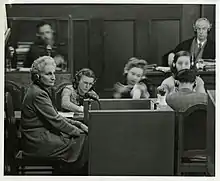Hanna Solf
Johanna Susanne Elisabeth Solf (née Dotti, 14 November 1887 – 4 November 1954) was a member of the German resistance to Nazism[1] and the founder of the Solf Circle group of intellectuals, opposed to the Nazi regime.[2]
Hanna Solf | |
|---|---|
.jpg.webp) Hanna Solf as a witness at the Nuremberg trials in 1947 | |
| Born | Johanna Dotti 14 November 1887 Neuhagen |
| Died | 4 November 1954 |
| Occupation | anti-fascist resistance member |
| Known for | founder and member of Solf Circle |
Early life
Solf was born in 1887 in Neuhagen. Her father, Georg Leopold Dotti, was an industrialist and banker.[3] She married Wilhelm Solf in 1908, who was then governor of German Samoa. Lagi von Ballestrem (born So'oa'emalelagi Solf in 1909) was their eldest child. Starting in 1928 they lived in Berlin, where Wilhelm died in 1936.[1]
Resistance to the Nazi regime
Hanna Solf and Elisabeth von Thadden frequently hosted tea parties for intellectuals opposed to the Nazi government, a group which would later be called Solf Circle (German: Solf-Kreis). They helped many victims of Nazi persecution to flee the country.[1] Solf and her daughter sheltered Jewish families in their house and helped others find hiding places.[4]
Arrest and detention
In September 1943, Solf attended a tea party organised by Elisabeth von Thadden. The party was infiltrated by the Gestapo agent Paul Reckzeh. Members of the Solf circle were arrested as a consequence.[4] Hanna Solf was detained on 12 January 1944 and ultimately brought to Ravensbrück concentration camp.[5] While several members of the group were executed, Solf and her daughter were freed before their trial when the Red Army liberated Ravensbrück.[1]

Life after liberation
At her liberation from Ravensbrück, Solf weighted only 42 kilograms. She appeared as witness at the Nuremberg trials. Solf lived retired from social life at the Lake Starnberg, until her death in 1954. Her housekeeper Martha Richter was taking care of her. Richter had joined the Solf family in 1911 and lived with Solf and her daughter since then and through the war.[6]
References
- "Johanna Solf". gdw-berlin.de (biography). Gedenkstätte Deutscher Widerstand. Retrieved 26 October 2019.
- Brown, Mark (19 May 2021). "Two UK galleries to share portrait of German doctor who resisted Nazis". Retrieved 22 February 2023.
- "Johanna Solf". The British Museum. Retrieved 22 February 2023.
- Lagi countess Ballestrem-Solf (2003). "Tea Party". In Boehm, Eric H. (ed.). We survived : fourteen histories of the hidden and hunted in Nazi Germany. Boulder, Colo: Westview Press. pp. 131–151.
- Weber, Konrad (July 2009). "Der Solfkreis" (in German). Retrieved 26 October 2019.
- Warkocz, Manuela (18 February 2020). "Die vergessene Widerstandskämpferin" [The forgotten resistance fighter]. Sueddeutsche Zeitung (in German). Retrieved 22 February 2023.
External links
![]() Media related to Hanna Solf at Wikimedia Commons
Media related to Hanna Solf at Wikimedia Commons